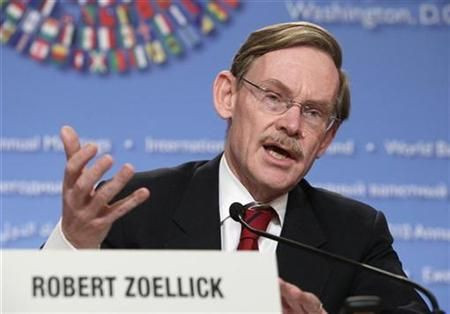Zoellick brings up gold standard, but why such opposition?

World Bank President Robert Zoellick is the most high-profile person in recent history to bring up the gold standard.
In light of the current global currency spat and fears of inflation (or deflation), Zoellick thought it would be good for the world to have a co-operative monetary system.
This system, he said, could use gold as a standard.
Zoellick, however, is alone in his endorsement and mainstream media, analysts, and think tanks almost universally dismissed the idea as archaic and impractical.
But why is there such an opposition to a system that enforces discipline, promotes stability, and protects savings?
The two main reasons are debt and related to that, government expenditures.
Major countries used the gold standard in the 19th century. However, they were forced to suspend them during wars because money-printing, instead of direct taxation or seizure of goods, was the easiest way for governments to finance them. Having a gold standard, of course, prevents money-printing.
The United States suspended the gold standard for the Civil War and the U.K. for the Napoleonic wars.
In the 20th century, major countries were forced to suspend the gold standard again to fund World War I.
Finally, the Great Depression forced all major countries to eventually leave the gold standard all together.
The Great Depression and the current Great Recession were both balance-sheet contractions. They were characterized by excessive leveraging (debt accumulation) and asset inflation that eventually led to spectacular crashes.
After the crash, major segments of society were stuck with excessive debt that prevented them from spending and investing. Debt, in other words, was preventing the economy from moving forward.
Seventy years ago, this debt problem was solved by leaving the gold standard and printing money, which made it easier to repay debt because debt's nominal value is fixed.
Professor Christina Romer of U.C. Berkeley, through her research of the Great Depression era, discovered a notable correlation between the time countries abandoned the gold standard (or devalued their currencies substantially) and a renewed growth in their output.
In 2010, the situation is similar. Adopting the gold standard now would not be a good idea because it would exacerbate the debt overhang problem and absolutely devastate the U.S. economy.
Instead, the government should work to ease debt burdens. They could do so through inflation, but an alternative is converting debt to equity.
However, the gold standard is not inherently flawed. In fact, when combined with other sensible policies, it leads to economic prosperity and stability.
Research by Professor Carmen Reinhart and Kenneth Rogoff showed that the 1940s to the late 1970s period, a time characterized by strict banking regulation and an international gold standard, is the only episode of global banking stability in the past 200 years.
The real culprit in the current economic system is utter dependency on excessive debt (which, again, is obviously incompatible with policies promoting stable asset prices.)
The U.S. government itself is the biggest debtor of them all and would be bankrupt instantly if the discipline of the gold standard were imposed on it.
The modus operandi of the modern financial sector would also end.
During the bubble years, the financial sector makes an inordinate amount of money (and transfers them to bankers and traders through large bonuses) through asset speculation and rampant lending. When everything comes crashing down, the government bails them out, cleans up the mess, and the next cycle begins.
The discipline of the gold standard, of course, will restrain bubbles in the first place, take away the government's ability to bail out banks, and stop this highly-lucrative money machine.
The current debt-based economic and financial system essentially punishes savers and average American citizens through bank bailouts and inflation. It is also designed to be incompatible with the gold standard and asset price stability, so these measures are never adopted.
Is there a realistic chance to revamp this debt-based and boom-and-bust economic system? The answer depends on political power.
In Japan, seniors who hold Japanese government debt wield enormous political power. Robert Feldman, Morgan Stanley's chief Japan economist, thinks these people influenced Japanese policy makers to prolong deflation in order to protect the value of government debt.
Unlike Japanese citizens, however, American citizens don't hold as much Treasuries because foreign countries like China hold them. China, as America's largest foreign creditor, is of course furious with the Federal Reserve's recent money-printing via quantitative easing. However, as long as the Chinese can't vote in American election, there may be little they can do.
Some American citizens, however, are angry about the government bailout of banks with taxpayer money. (However, fewer Americans, and perhaps even fewer senior citizens, understand the invisible taxation of inflation.)
This anger and realization has manifested in the Tea Party movement and the enormous attention presidential candidate Ron Paul received during his 2008 campaign.
Whether or not it leads to true reform of the America's economic system will depend on the extent of voters' realization of their situation. Another major crisis in the financial and economic system could galvanize a larger percentage of the American public.
Email Hao Li in New York at hao.li@ibtimes.com.
© Copyright IBTimes 2024. All rights reserved.





















